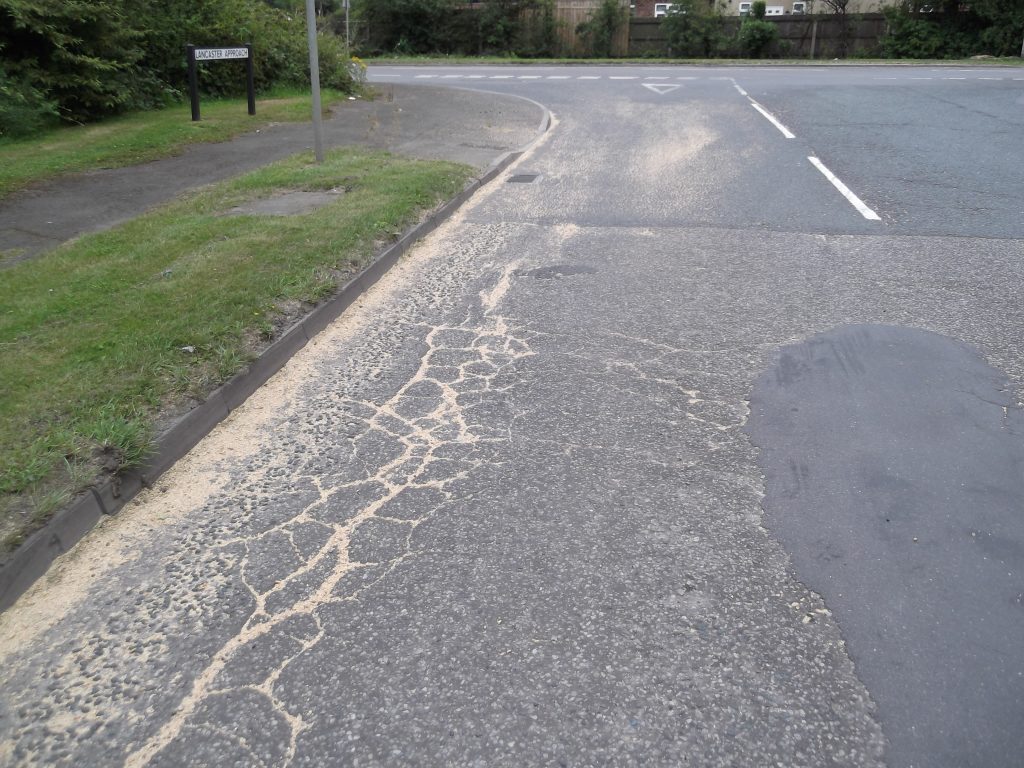Monday 28th August 2017
A press release from Action North Killingholme
In recent weeks, residents of North & South Killingholme, North Lincolnshire, have been subjected to 24-hour heavy traffic leaving trails of wood dust and bits of pellets strewn on their roads – covering an area of about four miles from the Port of Immingham to a local storage facility owned by the company NKS Salfina, based in the Lancaster Approach Industrial Estate. This estate is located just over the road from a residential area. The pellets are imported from North America to Immingham Docks, and transported to be burnt at Drax from there.
Local resident Gary Soulsby says:
“we’ve seen sawdust and bits of pellets falling off the back of trucks, off the top from under poorly fitting covers, and out of the sides and bottom. Many of the trucks are old, they’re rusty and noisy. Recently they were thundering to and fro, non stop for 24 hours a day, for six days and nights non stop. It has been an absolute nightmare. We couldn’t get any sleep or respite at all.”
On its website, Drax claims that the imported pellets are loaded straight into “state-of-the-art biomass wagons” on “specially adapted trains”1. However, in a recent email to a local resident, Drax admitted that because of lower demand for power in the summer, it had been storing pellets at the site owned by NKS Salfina in North Killingholme, transporting them there by truck. Local residents have also been advised that the haulier company Hargreaves is responsible for transporting the pellets there. Some of the many trucks used to transport the pellets have been drafted in from all over the country. Not very eco friendly at all.
Gary Soulsby continued:
“When the pellets get wet, they expand. After the rain last week, they were being washed all over the road, and our drains were blocked.”
Residents have contacted Drax to express their concerns. In response, Drax has cited ‘general conditions of the industrial estate’ and ‘the condition of the road surface’ as causes for the complaint, rather than its own operations and that of its sub contractors and the haulage company used. As a recipient of large amounts of bill payers’ money in ‘renewable energy’ subsidies2, Drax should be made more accountable to the people whose lives it disrupts and to clear up after itself.
Breathing in wood dust is harmful to health: it is associated with respiratory and nasal problems, including chronic bronchitis and increased incidents of asthma attacks as well as dermatitis3.
Although Drax describes its biomass pellets as ‘renewable’ energy and a more sustainable replacement to coal, an increasing number of scientists and civil society organisations disagree, due to the climate and biodiversity impacts of burning wood on this scale4. A recent investigation by Biofuelwatch revealed that particulate pollution from Drax has increased since the conversion to biomass5.

Residents have said it looks like a snowstorm – but it’s wood dust, from biomass pellets that got lost on the journey to Drax Power Station.
Contact:
Gary Soulsby (Action North Killingholme) 07909815992
2 In 2017, Drax will receive an estimated £567 million in ‘renewable energy’ subsidies for burning biomass, which could instead be going towards energy saving or ‘no-burn’ renewables such as wind or solar power. These subsidies are paid out of a surcharge on you electricity bill.
4 https://www.dogwoodalliance.org/2017/02/stop-exporting-southern-forests/; https://www.chathamhouse.org/about/structure/eer-department/environmental-impact-use-biomass-power-and-heat-project
